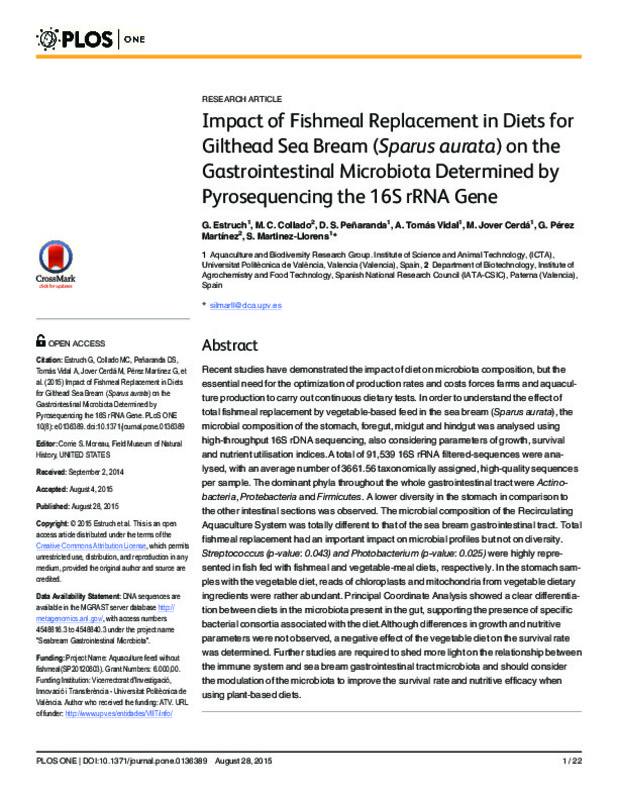JavaScript is disabled for your browser. Some features of this site may not work without it.
Buscar en RiuNet
Listar
Mi cuenta
Estadísticas
Ayuda RiuNet
Admin. UPV
Impact of Fishmeal Replacement in Diets for Gilthead Sea Bream (Sparus aurata) on the Gastrointestinal Microbiota Determined by Pyrosequencing the 16S rRNA Gene
Mostrar el registro sencillo del ítem
Ficheros en el ítem
| dc.contributor.author | Estruch, Guillem
|
es_ES |
| dc.contributor.author | Collado Amores, María Carmen
|
es_ES |
| dc.contributor.author | Peñaranda, D.S.
|
es_ES |
| dc.contributor.author | Tomas-Vidal, A.
|
es_ES |
| dc.contributor.author | Jover Cerdá, Miguel
|
es_ES |
| dc.contributor.author | Pérez-Martínez, G.
|
es_ES |
| dc.contributor.author | Martínez-Llorens, Silvia
|
es_ES |
| dc.date.accessioned | 2016-06-14T13:06:49Z | |
| dc.date.available | 2016-06-14T13:06:49Z | |
| dc.date.issued | 2015-08 | |
| dc.identifier.issn | 1932-6203 | |
| dc.identifier.uri | http://hdl.handle.net/10251/65883 | |
| dc.description.abstract | [EN] Recent studies have demonstrated the impact of diet on microbiota composition, but the essential need for the optimization of production rates and costs forces farms and aquaculture production to carry out continuous dietary tests. In order to understand the effect of total fishmeal replacement by vegetable-based feed in the sea bream (Sparus aurata), the microbial composition of the stomach, foregut, midgut and hindgut was analysed using high-throughput 16S rDNA sequencing, also considering parameters of growth, survival and nutrient utilisation indices.A total of 91,539 16S rRNA filtered-sequences were analysed, with an average number of 3661.56 taxonomically assigned, high-quality sequences per sample. The dominant phyla throughout the whole gastrointestinal tract were Actinobacteria, Protebacteria and Firmicutes. A lower diversity in the stomach in comparison to the other intestinal sections was observed. The microbial composition of the Recirculating Aquaculture System was totally different to that of the sea bream gastrointestinal tract. Total fishmeal replacement had an important impact on microbial profiles but not on diversity. Streptococcus (p-value: 0.043) and Photobacterium (p-value: 0.025) were highly represented in fish fed with fishmeal and vegetable-meal diets, respectively. In the stomach samples with the vegetable diet, reads of chloroplasts and mitochondria from vegetable dietary ingredients were rather abundant. Principal Coordinate Analysis showed a clear differentiation between diets in the microbiota present in the gut, supporting the presence of specific bacterial consortia associated with the diet.Although differences in growth and nutritive parameters were not observed, a negative effect of the vegetable diet on the survival rate was determined. Further studies are required to shed more light on the relationship between the immune system and sea bream gastrointestinal tract microbiota and should consider the modulation of the microbiota to improve the survival rate and nutritive efficacy when using plant-based diets. | es_ES |
| dc.description.sponsorship | Project Name: Aquaculture feed without fishmeal(SP20120603). Grant Numbers: 6.000,00. Funding Institution: Vicerrectorat d'Investigacio, Innovacio i Transferencia - Universitat Politecnica de Valencia. Author who received the funding: ATV. URL of funder: http://www.upv.es/entidades/VIIT/info/indexnormalc.html. The first author was supported by a contract-grant (Contrato Pre-doctoral del Programa para la Formacion de Personal Investigador - FPI) from Programa de Ayudas de Investigacion y Desarrollo (PAID) of Universitat Politecnica de Valencia. The funders had no role in study design, data collection and analysis, decision to publish, or preparation of the manuscript. | en_EN |
| dc.language | Inglés | es_ES |
| dc.publisher | Public Library of Science | es_ES |
| dc.relation.ispartof | PLoS ONE | es_ES |
| dc.rights | Reconocimiento (by) | es_ES |
| dc.subject | SALMO-SALAR L. | es_ES |
| dc.subject | TROUT ONCORHYNCHUS-MYKISS | es_ES |
| dc.subject | FARMED ATLANTIC SALMON | es_ES |
| dc.subject | STANDARD SOYBEAN-MEAL | es_ES |
| dc.subject | PLANT PROTEIN-SOURCES | es_ES |
| dc.subject | INTESTINAL MICROBIOTA | es_ES |
| dc.subject | GUT MICROBIOTA | es_ES |
| dc.subject | BACTERIAL COMMUNITIES | es_ES |
| dc.subject | NUTRIENT UTILIZATION | es_ES |
| dc.subject | AQUACULTURE SYSTEMS | es_ES |
| dc.subject.classification | BIOLOGIA ANIMAL | es_ES |
| dc.subject.classification | PRODUCCION ANIMAL | es_ES |
| dc.title | Impact of Fishmeal Replacement in Diets for Gilthead Sea Bream (Sparus aurata) on the Gastrointestinal Microbiota Determined by Pyrosequencing the 16S rRNA Gene | es_ES |
| dc.type | Artículo | es_ES |
| dc.identifier.doi | 10.1371/journal.pone.0136389 | |
| dc.relation.projectID | info:eu-repo/grantAgreement/UPV//SP20120603/ | es_ES |
| dc.rights.accessRights | Abierto | es_ES |
| dc.contributor.affiliation | Universitat Politècnica de València. Instituto de Ciencia y Tecnología Animal - Institut de Ciència i Tecnologia Animal | es_ES |
| dc.contributor.affiliation | Universitat Politècnica de València. Departamento de Ciencia Animal - Departament de Ciència Animal | es_ES |
| dc.description.bibliographicCitation | Estruch, G.; Collado Amores, MC.; Peñaranda, D.; Tomas-Vidal, A.; Jover Cerdá, M.; Pérez-Martínez, G.; Martínez-Llorens, S. (2015). Impact of Fishmeal Replacement in Diets for Gilthead Sea Bream (Sparus aurata) on the Gastrointestinal Microbiota Determined by Pyrosequencing the 16S rRNA Gene. PLoS ONE. 10:1-22. https://doi.org/10.1371/journal.pone.0136389 | es_ES |
| dc.description.accrualMethod | S | es_ES |
| dc.relation.publisherversion | https://dx.doi.org/10.1371/journal.pone.0136389 | es_ES |
| dc.description.upvformatpinicio | 1 | es_ES |
| dc.description.upvformatpfin | 22 | es_ES |
| dc.type.version | info:eu-repo/semantics/publishedVersion | es_ES |
| dc.description.volume | 10 | es_ES |
| dc.relation.senia | 293084 | es_ES |
| dc.identifier.pmid | 26317431 | en_EN |
| dc.identifier.pmcid | PMC4552794 | |
| dc.contributor.funder | Universitat Politècnica de València | es_ES |








